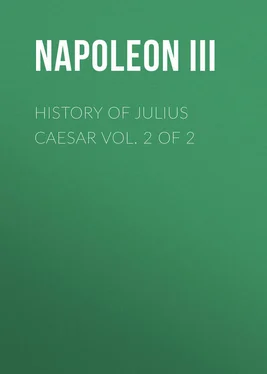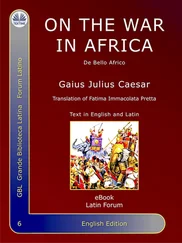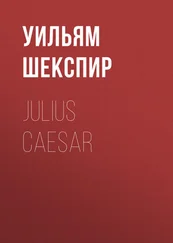Napoleon III - History of Julius Caesar Vol. 2 of 2
Здесь есть возможность читать онлайн «Napoleon III - History of Julius Caesar Vol. 2 of 2» — ознакомительный отрывок электронной книги совершенно бесплатно, а после прочтения отрывка купить полную версию. В некоторых случаях можно слушать аудио, скачать через торрент в формате fb2 и присутствует краткое содержание. Жанр: foreign_antique, foreign_prose, Биографии и Мемуары, на английском языке. Описание произведения, (предисловие) а так же отзывы посетителей доступны на портале библиотеки ЛибКат.
- Название:History of Julius Caesar Vol. 2 of 2
- Автор:
- Жанр:
- Год:неизвестен
- ISBN:нет данных
- Рейтинг книги:4 / 5. Голосов: 1
-
Избранное:Добавить в избранное
- Отзывы:
-
Ваша оценка:
- 80
- 1
- 2
- 3
- 4
- 5
History of Julius Caesar Vol. 2 of 2: краткое содержание, описание и аннотация
Предлагаем к чтению аннотацию, описание, краткое содержание или предисловие (зависит от того, что написал сам автор книги «History of Julius Caesar Vol. 2 of 2»). Если вы не нашли необходимую информацию о книге — напишите в комментариях, мы постараемся отыскать её.
History of Julius Caesar Vol. 2 of 2 — читать онлайн ознакомительный отрывок
Ниже представлен текст книги, разбитый по страницам. Система сохранения места последней прочитанной страницы, позволяет с удобством читать онлайн бесплатно книгу «History of Julius Caesar Vol. 2 of 2», без необходимости каждый раз заново искать на чём Вы остановились. Поставьте закладку, и сможете в любой момент перейти на страницу, на которой закончили чтение.
Интервал:
Закладка:
The Druids were exempt from military service and from taxes. 128These privileges drew many disciples, whose novitiate, which lasted sometimes twenty years, consisted in learning by heart a great number of verses containing their religious precepts. It was forbidden to transcribe them. This custom had the double object of preventing the divulgation of their doctrine and of exercising the memory. Their principal dogma was the immortality of the soul and its transmigration into other bodies. A belief which banished the fear of death appeared to them fitted to excite courage. They explained also the movement of the planets, the greatness of the universe, the laws of nature, and the omnipotence of the immortal gods. “We may conceive,” says the eminent author of the Histoire des Gaulois , “what despotism must have been exercised over a superstitious nation by this caste of men, depositaries of all knowledge, authors and interpreters of all law, divine or human, remunerators, judges, and executioners.” 129
The knights, when required by the necessities of war, and that happened almost yearly, were all bound to take up arms. Each, according to his birth and fortune, was accompanied by a greater or less number of attendants or clients. Those who were called ambacti 130performed in war the part of esquires. 131In Aquitaine, these followers were named soldures ; they shared the good as well as the evil fortune of the chief to whom they were attached, and, when he died, not one of them would survive him. Their number was considerable: we shall see a king of the Sotiates possess no less than six hundred of them. 132
The states were governed either by an assembly, which the Romans called a senate, or by a supreme magistrate, annual or for life, bearing the title of king, 133prince, 134or vergobret . 135
The different tribes formed alliances among themselves, either permanent or occasional; the permanent alliances were founded, some on a community of territorial interests, 136others on affinities of races, 137or on treaties, 138or, lastly, on the right of patronage. 139The occasional alliances were the results of the necessity of union against a common danger. 140
In Gaul, not only each state and each tribe ( pagus ), but even each family, was divided into two parties ( factiones ); at the head of these parties were chiefs, taken from among the most considerable and influential of the knights. Cæsar calls them principes . 141All those who accepted their supremacy became their clients; and, although the principes did not exercise a regular magistracy, their authority was very extensive. This organisation had existed from a remote antiquity; its object was to offer to each man of the people a protection against the great, since each was thus placed under the patronage of a chief, whose duty it was to take his cause in hand, and who would have lost all credit if he had allowed one of his clients to be oppressed. 142We see in the “Commentaries” that this class of the principes enjoyed very great influence. On their decisions depended all important resolutions; 143and their meeting formed the assembly of the whole of Gaul ( concilium totius Galliæ ). 144In it everything was decided by majority of votes. 145
Affairs of the state were allowed to be treated only in these assemblies. It appertained to the magistrates alone to publish or conceal events, according as they judged expedient; and it was a sacred duty for any one who learnt, either from without or from public rumour, any news which concerned the civitas , to give information of it to the magistrate, without revealing it to any other person. This measure had for its object to prevent rash or ignorant men from being led into error by false reports, and from rushing, under this first impression, into extravagant resolutions.
In the same manner as each state was divided into two rival factions, so was the whole of Gaul (with the exception of Belgic Gaul and Helvetia) divided into two great parties, 146which exercised over the others a sort of sovereignty ( principatus ); 147and when, in extraordinary circumstances, the whole of Gaul acknowledged the pre-eminence of one particular state, the chief of the privileged state took the name of princeps totius Galliæ , as had been the case with the Arvernan Celtillus, the father of Vercingetorix. 148
This supremacy, nevertheless, was not permanent; it passed from one nation to another, and was the object of continual ambitions and sanguinary conflicts. The Druids, it is true, had succeeded in establishing a religious centre, but there existed no political centre. In spite of certain federative ties, each state had been more engaged in the consideration of its own individuality than in that of the country in general. This egoistic carelessness of their collective interests, this jealous rivality among the different tribes, paralysed the efforts of a few eminent men who were desirous of founding a nationality, and the Gauls soon furnished the enemy with an easy means of dividing and combating them. The Emperor Napoleon I. was thus right in saying: “The principal cause of the weakness of Gaul was the spirit of isolation and locality which characterised the population; at this epoch the Gauls had no national spirit or even provincial spirit; they were governed by a spirit of town. It is the same spirit which has since forged chains for Italy. Nothing is more opposed to national spirit, to general ideas of liberty, than the particular spirit of family or of town. From this parcelling it resulted that the Gauls had no army of the line kept up and exercised; and therefore no art and no military science. Every nation which should lose sight of the importance of an army of the line perpetually on foot, and which should trust to levies or national armies, would experience the fate of the Gauls, without even having the glory of opposing the same resistance, which was the effect of the barbarism of the time and of the ground, covered with forests, marshes, and bogs, and without roads, which rendered it difficult to conquer and easy to defend.” 149Before Cæsar came into Gaul, the Ædui and the Arverni were at the head of the two contending parties, each labouring to carry the day against his rival. Soon these latter united with the Sequani, who, jealous of the superiority of the Ædui, the allies of the Roman people, invoked the support of Ariovistus and the Germans. By dint of sacrifices and promises, they had succeeded in bringing them into their territory. With this aid the Sequani had gained the victory in several combats. 150The Ædui had lost their nobility, a part of their territory, nearly all their clients, and, after giving up as hostages their children and their chiefs, they had bound themselves by oath never to attack the Sequani, who had at length obtained the supremacy of all Gaul. It was under these circumstances that Divitiacus had gone to Rome to implore the succour of the Republic, but he had failed; 151the Senate was too much engaged with intestine quarrels to assume an energetic attitude towards the Germans. The arrival of Cæsar was destined to change the face of things, and restore to the allies of Rome their old preponderance. 152
CHAPTER III.
CAMPAIGN AGAINST THE HELVETII
Projects of Invasion by the Helvetii.
I. CÆSAR, as we have seen, had received from the Senate and people a command which comprised the two Gauls (Transalpine and Cisalpine) and Illyria. 153Yet the agitation which continued to reign in the Republic was retaining him at the gates of Rome, when suddenly, towards the spring of 696, news came that the Helvetii, returning to their old design, were preparing to invade the Roman province. This intelligence caused a great sensation.
Читать дальшеИнтервал:
Закладка:
Похожие книги на «History of Julius Caesar Vol. 2 of 2»
Представляем Вашему вниманию похожие книги на «History of Julius Caesar Vol. 2 of 2» списком для выбора. Мы отобрали схожую по названию и смыслу литературу в надежде предоставить читателям больше вариантов отыскать новые, интересные, ещё непрочитанные произведения.
Обсуждение, отзывы о книге «History of Julius Caesar Vol. 2 of 2» и просто собственные мнения читателей. Оставьте ваши комментарии, напишите, что Вы думаете о произведении, его смысле или главных героях. Укажите что конкретно понравилось, а что нет, и почему Вы так считаете.












